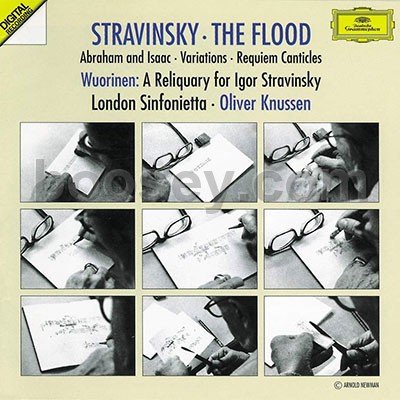OPERNSUCHE
The Flood
(1961-62)Text: Book of Genesis, York and Chester Miracle plays (L-E,L-F,L-G)
T,2B,7speakers; SAT chorus
3(III=picc).afl.2.corA.2.bcl.dbcl.2.dbn-4.3.2.btrbn.1-timp.perc:
xylorimba/3tom-t/cyms/BD-harp-cel(=pft)-strings
Abkürzungsverzeichnis (PDF)
Boosey & Hawkes
CBS Television Network broadcast
George Balanchine, choreographer
Dirigent: Robert Craft
Ensemble: CBS Television Network
| LUCIFER | Tenor |
| GOD | 2 Basses |
| NARRATOR | Spoken role |
| NOAH | Spoken role |
| NOAH'S WIFE AND SONS | Spoken roles |
| CALLER | Spoken role |
| Chorus | SAT |
After a prelude and choral Te Deum, a speaking Narrator tells of God’s creation of the Earth. God himself, sung by two bass voices, brings into being Adam and Eve and then Lucifer, who is swiftly expelled from Heaven to become Satan. In revenge, Satan tempts Eve who tempts Adam. To purge the world of this wickedness, God decides to send a flood. All living things will be destroyed except for Noah, who is told to build an ark and save himself and his family, as well as pairs of all living animals and birds. Noah builds the boat and takes his family, the animals and birds on board. Only his wife refuses to come into the ark until persuaded by the pleadings of her three sons. In anger, she boxes her husband’s ears. After the swirling music of the flood, this short ‘musical play’ ends with The Covenant of the Rainbow. God promises to take care of Noah and his descendants, Noah promises his family will be true to God, Satan still vows revenge and finally God blesses Noah and his sons. A choral Sanctus leads back to the music of the opening.
Commissioned by CBS television, The Flood conflates the Creation with the story of Noah's ark. Stravinsky: "Why did I call my work The Flood, instead of Noah? Because Noah is mere history. As a genuine antediluvian he is a great curiosity, but a sideshow curiosity. And even as 'eternal man,' the second Adam, the – to Augustinians – Old Testament Christ image, he is less important than the Eternal Catastrophe. The Flood is also The Bomb." God, impressively strange, is sung by two basses, Lucifer by a tenor; there is also a Caller (for the animal parade) and a Narrator. Stravinsky called the "musical speed" of The Flood "cinematographic;" writing for television, he eagerly dispensed with "the afflatus of overtures, connecting episodes, curtain music."
Repertoire note by Joseph Horowitz
The Flood was commissioned as a ‘musical play’ for television, with speaking, singing and instrumental parts. His assistant Robert Craft devised the text from the book of Genesis plus the York and Chester miracle plays. Stravinsky was very taken with the idea of working in the relatively new medium of television, and it inspired from him an intricate serial structure. It did not come across well on the television, however, not helped by being bookended by shampoo commercials, and it has had precious few stage productions. It is therefore ripe for a serious modern production, perhaps paired with a church parable by Britten, or with other of Stravinsky’s Old Testament pieces. The American director Peter Sellars has staged a collection of these sacred works under the title Biblical Pieces.
Repertoire note by Jonathan Cross
Comic, Poetic

Peter Hall, David Wilson-Johnson, Stephen Richardson, Michael Berkeley, Bernard Jacobson, Lucy Shelton, London Sinfonietta, Oliver Knussen
Deutsche Grammophon E4470682

